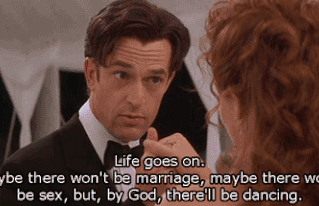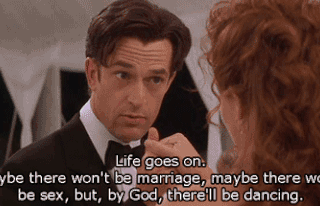It is a truth universally acknowledged that most people prefer their romantic comedies to have classic cliches, lovable characters and conflicts neatly wrapped up when the rolling credits come around.
But what about the movies that have none of these qualities, and instead are jammed full of unlikeable characters who consistently make the worst and most chaotic decisions, with a conclusion that is less than satisfying in many regards? Enter “My Best Friend’s Wedding.”
“My Best Friend’s Wedding” is a 1997 romantic comedy, perhaps best known for saving Julia Roberts’ career after a series of box office flops. Julianne Potter, played by Roberts, embarks on a deranged, jealous tirade after learning that her best friend, Michael O’Neal, played by Dermot Mulroney, is about to marry a perky 20-year-old college student, Kimmy Wallace, played by Cameron Diaz. Of course, once he is engaged, she finally realizes that she is in love with him! What follows is a hilarious and choppy string of countless schemes and lies as Julianne tries to derail their relationship, including a fake engagement to make Michael jealous and failed attempts to get Kimmy on her side.
This film is utterly ridiculous and unpredictable. There are multiple breakout singing sessions, a wild car chase and a plethora of emotional breakdowns from almost every character. The film itself feels disconnected as it jumps from scene to scene, creating the constant tension of never knowing what wild maneuver Julianne will make next.
Rather than giving us lovable characters and someone to root for, “My Best Friend’s Wedding” is full of flawed and unlikeable characters, and not in a charming way. Michael is wishy-washy, has an unfortunate temper and literally kisses the not bride-to-be hours before his wedding. Kimmy is naive in a cute way, but ultimately, her lack of true autonomy does not make her seem romantic; it just makes her seem pathetic as she crawls back to Michael, even knowing she may be his second choice.
But the real kicker is Miss Julianne Potter, better known as Jules. The ultimate “not like other girls,” Jules is a cold, unromantic career woman who, as Kimmy notes, is not up for conventional “female priorities.” She is mocked as a woman who does not have time for marriage, romance or love which unfortunately, has become an exhausting on-screen cliche to categorize women as either being romantic or career-driven—there is no in-between or room for both to make a a woman in film an acceptable and palatable character.
But what really makes Jules unlikeable are the countless bad and idiotic decisions she makes throughout the film. She flirts incessantly with the groom-to-be, sabotages the wedding in petty ways and confesses inauthentic love to Michael in the name of fear of change and losing the one constant in her life, all while doubting whether or not she actually loves him.
Yet despite her horrific behavior, Jules still manages to be an exceptionally charming character. Journalist and author Dolly Alderton describes Julia Roberts as notoriously “playing fucking annoying characters, but she is never annoying.” No Roberts heroine better embodies this sentiment than Miss Julianne Potter, who may be a nutter on-screen, but still manages to make the film a delight to watch.
Viewers can’t help but be infatuated by Jules when she remarks about her unexpected love for Michael, “It’s amazing the clarity that comes with psychotic jealousy.” As she bursts into an iconic and infectious Julia Roberts laugh, one can’t help but momentarily admire Jules’ mission to break up the wedding, misguided as it is. When she ultimately loses at the end, one admires how she finds the courage to be happy for the couple and accepts her own defeat, offering her and Michael’s song for the first dance as an apology.
When I first watched this film as a tween, I criticized it for portraying women in an extremely shallow and unrealistic light. But upon continuous rewatches, I have found myself increasingly more and more charmed by the extremes of its leading lady. Jules may be annoying, but she represents real mistakes people can make in the oftentimes foolish game of love. She may act deranged at times, but it’s only because she is deeply afraid of the need that she suddenly feels inside “to belong to someone.” She is not, in fact, unlikeable, instead, she is authentic, messy and human.
Moreover, the true savior of this film is none other than George Downes, played by Rupert Everett, Jules’s charismatic and effortlessly hilarious gay editor, who swoops in to steal every scene. From overplaying the role of Jules’s fiance to breaking into a wild rendition of “I Say a Little Prayer” to embarrass her, George is the true best friend that anyone should want to have around. He is also the ultimate voice of reason, as after a hysterical car chase through Chicago, he points out to Jules, “Who’s chasing you? Nobody. Get it? There’s your answer.”
The film is ultimately redeemed in the final scene, which has perhaps the most realistic romantic comedy ending. There is no rom–well, not the kind of rom you would expect. After failing to break up the happy couple, Jules sits in a gorgeous purple dress when she receives a call from George, who makes a surprise appearance to cheer her up. George remarks, “Maybe there won’t be marriage, maybe there won’t be sex, but by God, there’ll be dancing,” before sweeping Jules into his arms and glamorously leading her onto the dance floor.
This ending truly is romantic, with Jules not dancing in the arms of the man she thought she loved, but with her true best friend, who has been constant and supportive of her, bad decisions and all. What makes “My Best Friend’s Wedding” inspiring is the way in which it turns the traditional rom-com on its head, showing a love story that does not work out, but despite this, all hope is not lost–instead, there is still joy to be found in friendships and the people who are still there, when everything else threatens to crash and burn.


